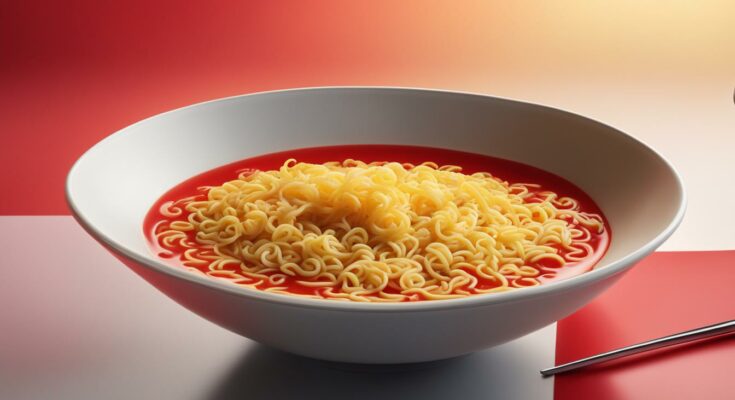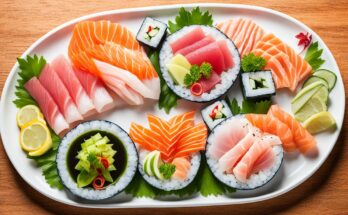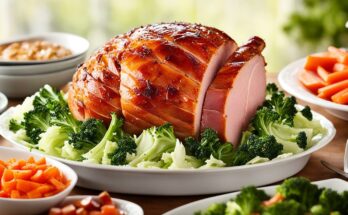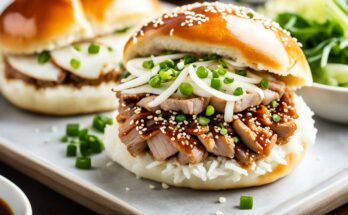Instant noodles are a staple for many college students, busy professionals, and anyone in need of a quick, easy, and affordable meal. However, their convenience and popularity have led to concerns about their impact on health and nutrition. This article will explore the question of how often it is safe to consume instant noodles and provide tips for incorporating them into a balanced diet.
Key Takeaways
- Instant noodles can be enjoyed as part of a balanced diet, but it’s important to practice portion control and avoid excessive consumption.
- Aim to incorporate nutritious ingredients like vegetables, proteins, and healthy oils to increase the nutritional value of your instant noodles.
- Consider creating an instant noodle diet plan that includes a variety of foods to ensure you’re getting all the nutrients your body needs.
- Be aware of the potential health risks associated with excessive instant noodle consumption, including weight gain and cardiovascular issues.
- Remember to prioritize overall dietary diversity and moderation for optimal health.
The Nutritional Value of Instant Noodles
Instant noodles are appreciated for their convenience and affordability, but what is their nutritional value? Let’s take a closer look.
According to the USDA, a serving size of instant noodles without seasoning has approximately:
| Nutrient | Amount per serving |
|---|---|
| Calories | 188 |
| Carbohydrates | 27 grams |
| Fat | 7 grams |
| Sodium | 891 milligrams |
It’s important to note that these values may vary depending on the brand and flavor. The seasoning packet that comes with the noodles adds extra calories, sodium, and flavorings, so it’s recommended to use it in moderation.
Despite their reputation for being unhealthy, instant noodles do have some nutritional benefits. They are a good source of carbohydrates, which provide energy for the body. Additionally, some brands have started adding protein and fiber to their noodles to enhance their nutritional value.
However, instant noodles are also high in sodium, which can contribute to high blood pressure and other health issues. It’s important to monitor sodium intake and consume instant noodles in moderation.
The Pros and Cons of Instant Noodles
“Instant noodles are an okay food choice in moderation. They should not replace a meal, but can supplement a meal that is already rich in nutrients.”
Emily Hein, RDN, LDN
- Pros:
- Convenient and affordable
- Good source of carbohydrates
- Can provide a quick meal option
- Cons:
- High in sodium
- May contain preservatives and additives
- Low in nutrients compared to a balanced meal
Overall, instant noodles can be a part of a balanced diet when consumed in moderation and supplemented with other nutrient-rich foods. It’s important to read labels and choose noodles with lower sodium and fewer additives, and to avoid consuming them as a sole source of nutrition.
Recommended Serving Size for Instant Noodles
If you’re a fan of instant noodles, it’s essential to control your portions. The appropriate serving size can help you avoid consuming excessive amounts of sodium, calories, and carbohydrates. So, what is the recommended serving size for instant noodles?
The standard serving size for a pack of instant noodles is one cup, which weighs around 70 grams. However, many brands offer larger portion sizes of up to three cups per pack. It’s essential to check the packet’s nutritional information to determine the serving size of your preferred brand.
Moreover, if you’re looking to manage your calorie intake, consider a half serving of instant noodles to keep your portions in check. You can also pair your instant noodles with a side of veggies, like broccoli or carrots, to add nutrients to your meal.
Instant Noodles Nutrition Facts and Serving Size
| Nutrition | Per Serving (70g) |
|---|---|
| Calories | 290 |
| Total Fat | 12g |
| Carbohydrates | 38g |
| Sodium | 1470mg |
As you can see, instant noodles have a high sodium content, which is nearly 60% of your daily recommended intake. However, they also provide carbohydrates, fat, and calories that can provide energy for your activities. Balancing your instant noodle intake with fruits, vegetables, and proteins can ensure a complete meal.
Now that you know the recommended serving size for instant noodles, you can indulge in your favorite noodles while ensuring a healthy diet. Remember to control your portions, pair them with nutrient-dense ingredients, and balance your meals to meet your dietary needs.
Best Practices for Eating Instant Noodles
Instant noodles can be a convenient and tasty meal option, but it’s important to consume them in a healthy way. Here are some best practices for healthy instant noodle consumption:
- Choose low-sodium options: Excessive sodium consumption can be harmful to heart health. Look for instant noodles with lower sodium content per serving.
- Avoid excessive seasoning: Flavor packets that come with instant noodles can be high in sodium and other unhealthy ingredients. Consider using only a portion of the packet or adding your own seasoning using healthier options such as herbs and spices.
- Add vegetables: To improve the nutritional content of your instant noodles, try adding fresh or frozen vegetables like carrots, broccoli, or spinach.
- Incorporate protein: Including protein in the form of chicken, beef, tofu, or eggs can help you feel fuller and more satisfied after your meal.
- Practice portion control: Stick to the recommended serving size and avoid eating multiple packages in one sitting.
“By choosing low-sodium options, avoiding excessive seasoning, adding vegetables and protein, and practicing portion control, you can enjoy instant noodles in a healthy way.”
Limits on Instant Noodle Consumption
While instant noodles can be a convenient and tasty meal option, consuming them excessively can lead to potential health risks. As with any food, moderation is key, and it is crucial to be mindful of the nutrient content of instant noodles and their impact on your overall diet.
One major concern with excessive instant noodle consumption is its impact on weight management. Instant noodles are high in calories and lack essential nutrients, which can lead to weight gain over time. In addition, the high levels of sodium in instant noodles can lead to water retention, further contributing to bloating and weight gain.
Another health risk associated with excessive instant noodle consumption is its impact on cardiovascular health. The high levels of sodium in instant noodles can lead to increased blood pressure, which can increase the risk of heart disease and stroke. Additionally, the high levels of saturated and trans fats in some instant noodle varieties can contribute to high cholesterol levels, which also increase the risk of heart disease.
It is important to note that not all instant noodles are created equal, and some varieties may be less harmful than others. For example, low-sodium instant noodles or those made with whole wheat or other whole grains may be a healthier option. However, even these varieties should be consumed in moderation and as part of a balanced diet.
Limiting Your Consumption
To minimize the potential health risks associated with instant noodle consumption, it is recommended to limit your intake to no more than two to three times per week. Additionally, it is important to monitor portion sizes and avoid consuming multiple servings in one sitting.
When preparing instant noodles, it is also important to be mindful of the seasoning packets that often come with them. These packets are typically high in sodium and can significantly contribute to the overall sodium content of the dish. Consider using only a portion of the seasoning packet or replacing it with low-sodium alternatives such as herbs, spices, or vinegar.
Lastly, incorporating other nutrient-dense foods into your instant noodle meals can help balance out their nutrient content and minimize their impact on your overall diet. Adding protein such as chicken, tofu, or beans, as well as a variety of vegetables, can help increase the nutritional value of your meal and provide a more balanced meal.
Creating a Balanced Diet with Instant Noodles
Instant noodles can be a great addition to a balanced diet when consumed in moderation and with thoughtful consideration for their nutritional value. Here are some tips for creating a well-rounded meal with instant noodles:
- Choose noodles made from whole grains for added fiber and nutrients.
- Pair noodles with a variety of vegetables for a healthy mix of vitamins and minerals. Consider options like broccoli, carrots, and mushrooms, which can add flavor and texture to your dish.
- Include a lean protein source, such as chicken, tofu, or shrimp, to help keep you feeling full and satisfied.
- Experiment with different seasonings and sauces to flavor your noodles without adding excess sodium. Some healthy options include ginger, garlic, and low-sodium soy sauce.
Here’s an example of a balanced meal featuring instant noodles:
| Meal Component | Food Option |
|---|---|
| Whole grain noodles | Whole wheat ramen noodles |
| Vegetables | Broccoli, carrots, and red bell pepper sautéed in olive oil |
| Protein | Grilled chicken breast seasoned with low-sodium soy sauce and garlic |
| Garnish | Sesame seeds and sliced green onions |
By incorporating instant noodles into a well-rounded meal like this, you can enjoy their convenience and delicious flavor without compromising your nutritional goals.
Conclusion
In conclusion, it is possible to enjoy instant noodles as part of a healthy and balanced diet. By following the recommended serving sizes and practicing portion control, you can avoid excessive consumption and potential health risks. Incorporating nutritious ingredients such as vegetables and lean proteins can elevate the nutritional value of instant noodles, making them a satisfying and versatile meal option.
It is important to remember that instant noodles should not be relied upon as a sole source of nutrition. A diet that includes a variety of whole foods is essential for overall health and wellness. When consumed in moderation, instant noodles can be a convenient and enjoyable addition to your diet.
Stay Mindful of Your Noodle Consumption
As with any food, it is important to stay mindful of your instant noodle consumption. While they can be a delicious and convenient meal option, excessive consumption can lead to negative health outcomes such as weight gain and reduced cardiovascular health.
By prioritizing a balanced diet and incorporating a variety of foods, you can ensure that instant noodles are just one part of a healthy and enjoyable lifestyle.
FAQ
How often can I eat instant noodles?
The frequency of instant noodle consumption depends on your overall diet and health goals. It is generally recommended to consume instant noodles in moderation as part of a balanced diet.
What is the nutritional value of instant noodles?
Instant noodles typically contain calories, carbohydrates, fat, and sodium. The specific nutritional content may vary between brands and flavors. It is important to read the packaging for accurate information.
What is the recommended serving size for instant noodles?
The recommended serving size for instant noodles can vary, but it is typically around 1 to 2 cups of cooked noodles. It is important to follow the serving size guidelines to maintain portion control.
What are the best practices for eating instant noodles?
To consume instant noodles in a healthy way, consider adding nutritious ingredients like vegetables or lean proteins to enhance the nutritional value. It is also advised to avoid excessive seasoning and to balance instant noodles with other foods for a more complete meal.
Are there any limits on instant noodle consumption?
Excessive instant noodle consumption may have potential health risks. It is important to be mindful of the impact on weight management and cardiovascular health. Moderation is key to maintaining a healthy diet.
How can I create a balanced diet with instant noodles?
Instant noodles can be incorporated into a balanced diet by pairing them with a variety of vegetables, proteins, and other nutrient-rich foods. This helps ensure you are getting the necessary nutrients for overall health and well-being.



